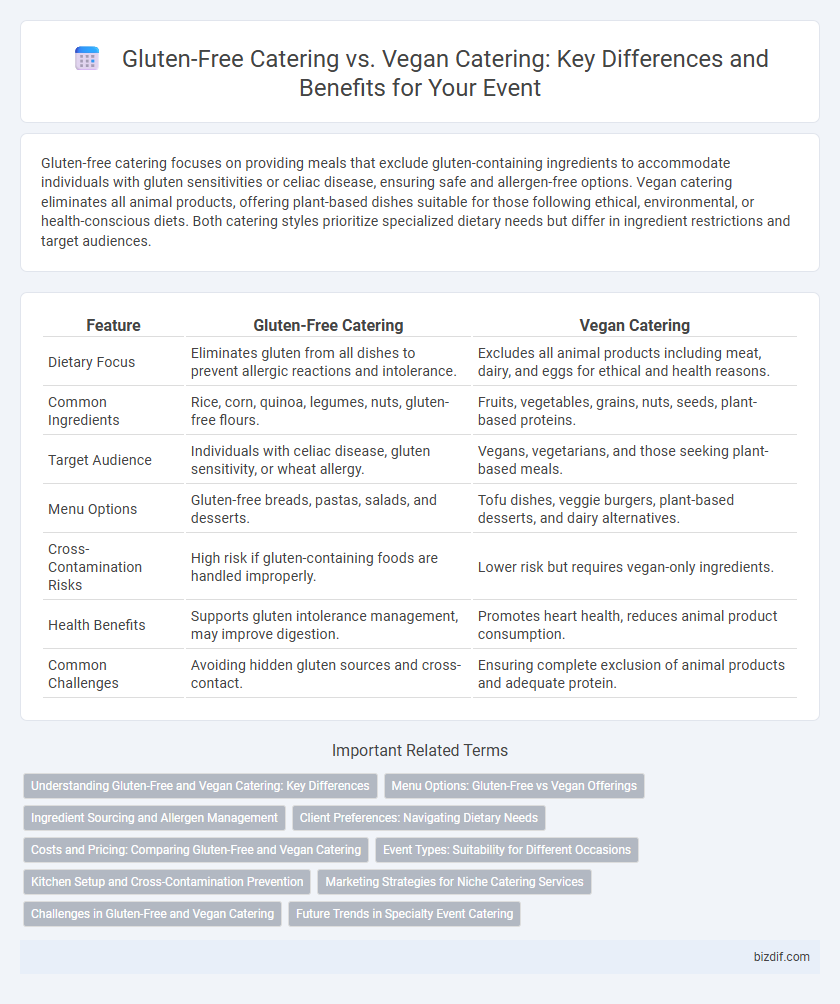Gluten-free catering focuses on providing meals that exclude gluten-containing ingredients to accommodate individuals with gluten sensitivities or celiac disease, ensuring safe and allergen-free options. Vegan catering eliminates all animal products, offering plant-based dishes suitable for those following ethical, environmental, or health-conscious diets. Both catering styles prioritize specialized dietary needs but differ in ingredient restrictions and target audiences.
Table of Comparison
| Feature | Gluten-Free Catering | Vegan Catering |
|---|---|---|
| Dietary Focus | Eliminates gluten from all dishes to prevent allergic reactions and intolerance. | Excludes all animal products including meat, dairy, and eggs for ethical and health reasons. |
| Common Ingredients | Rice, corn, quinoa, legumes, nuts, gluten-free flours. | Fruits, vegetables, grains, nuts, seeds, plant-based proteins. |
| Target Audience | Individuals with celiac disease, gluten sensitivity, or wheat allergy. | Vegans, vegetarians, and those seeking plant-based meals. |
| Menu Options | Gluten-free breads, pastas, salads, and desserts. | Tofu dishes, veggie burgers, plant-based desserts, and dairy alternatives. |
| Cross-Contamination Risks | High risk if gluten-containing foods are handled improperly. | Lower risk but requires vegan-only ingredients. |
| Health Benefits | Supports gluten intolerance management, may improve digestion. | Promotes heart health, reduces animal product consumption. |
| Common Challenges | Avoiding hidden gluten sources and cross-contact. | Ensuring complete exclusion of animal products and adequate protein. |
Understanding Gluten-Free and Vegan Catering: Key Differences
Gluten-free catering focuses on eliminating gluten-containing ingredients such as wheat, barley, and rye to accommodate individuals with celiac disease or gluten sensitivity, ensuring safe and allergen-free meals. Vegan catering excludes all animal products, including meat, dairy, eggs, and honey, prioritizing plant-based ingredients for ethical, environmental, or health reasons. Both caterings require specialized menu planning and ingredient sourcing to meet dietary restrictions, but gluten-free caters specifically to allergen avoidance, while vegan caters to ethical and lifestyle choices.
Menu Options: Gluten-Free vs Vegan Offerings
Gluten-free catering menus prioritize dishes that exclude wheat, barley, and rye, featuring alternatives like quinoa, rice, and gluten-free grains to accommodate clients with celiac disease or gluten sensitivity. Vegan catering emphasizes plant-based ingredients, eliminating all animal products such as meat, dairy, eggs, and honey, with menu options including legumes, vegetables, nuts, and soy-based proteins. Both catering styles focus on health-conscious, allergen-friendly options but differ in their core dietary restrictions and ingredient selections.
Ingredient Sourcing and Allergen Management
Gluten-free catering prioritizes sourcing certified gluten-free grains and flours, ensuring strict cross-contamination controls to protect clients with celiac disease or gluten sensitivity. Vegan catering emphasizes plant-based, organic ingredients, avoiding animal products while managing potential allergens like soy and nuts commonly found in vegan substitutes. Both approaches require meticulous supplier vetting and kitchen protocols to maintain ingredient integrity and allergen safety.
Client Preferences: Navigating Dietary Needs
Clients seeking gluten-free catering prioritize strict avoidance of gluten-containing ingredients to prevent allergic reactions or celiac disease symptoms, ensuring safe meal options like rice, quinoa, and naturally gluten-free vegetables. Vegan catering appeals to those who exclude all animal products for ethical, environmental, or health reasons, demanding creative plant-based dishes rich in protein and nutrients from legumes, grains, and vegetables. Understanding these distinct dietary needs allows caterers to tailor menus effectively, enhancing client satisfaction and accommodating diverse preferences.
Costs and Pricing: Comparing Gluten-Free and Vegan Catering
Gluten-free catering often incurs higher costs due to the need for specialized ingredients and strict cross-contamination controls, which can lead to increased kitchen labor and ingredient expenses. Vegan catering typically offers more flexibility with plant-based staples like grains, legumes, and vegetables, making it potentially more cost-effective while still accommodating dietary restrictions. Pricing for both options varies significantly based on menu complexity, ingredient sourcing, and customization requirements, but gluten-free menus generally command a premium price point compared to vegan offerings.
Event Types: Suitability for Different Occasions
Gluten-free catering is ideal for events where guests have dietary restrictions due to celiac disease or gluten intolerance, such as weddings, corporate meetings, and health-focused seminars. Vegan catering suits occasions promoting sustainability, animal welfare, or plant-based lifestyles, including eco-conscious festivals, charity events, and wellness retreats. Both catering styles can be tailored to formal banquets or casual gatherings, ensuring inclusive menu options that accommodate diverse dietary preferences and enhance guest satisfaction.
Kitchen Setup and Cross-Contamination Prevention
Gluten-free catering requires a dedicated kitchen setup that strictly avoids gluten exposure by using separate utensils, surfaces, and storage areas to prevent cross-contamination. Vegan catering emphasizes eliminating all animal products, necessitating careful segregation of plant-based ingredients and cleaning protocols to avoid any contact with animal-derived substances. Both catering styles demand rigorous staff training and meticulous workflow management to maintain food safety and uphold dietary restrictions.
Marketing Strategies for Niche Catering Services
Gluten-free catering targets clients with dietary restrictions related to celiac disease or gluten sensitivity by emphasizing allergen-free, verified ingredient sourcing and transparent menu labeling. Vegan catering appeals to ethical consumers and environmental advocates by highlighting plant-based, cruelty-free options and sustainability certifications in marketing campaigns. Effective niche catering strategies leverage targeted social media ads, influencer partnerships, and tailored content that addresses specific health, wellness, or lifestyle trends to capture distinct customer segments.
Challenges in Gluten-Free and Vegan Catering
Gluten-free catering faces challenges such as avoiding cross-contamination and sourcing certified gluten-free ingredients to prevent adverse reactions in sensitive individuals. Vegan catering requires careful selection of plant-based proteins and ensuring no animal-derived ingredients are present, which can complicate menu planning and ingredient sourcing. Both types demand rigorous kitchen protocols and staff training to maintain strict dietary compliance and customer safety.
Future Trends in Specialty Event Catering
Gluten-free catering is expected to see increased demand as awareness of celiac disease and gluten sensitivities grows, prompting event organizers to prioritize safe, allergen-free options. Vegan catering, driven by rising environmental concerns and plant-based dietary preferences, will continue to expand with innovative, nutrient-rich menu offerings tailored for sustainability. Future trends in specialty event catering emphasize personalized dietary solutions, integrating technology for seamless customization and real-time allergy management.
Gluten-free catering vs Vegan catering Infographic

 bizdif.com
bizdif.com